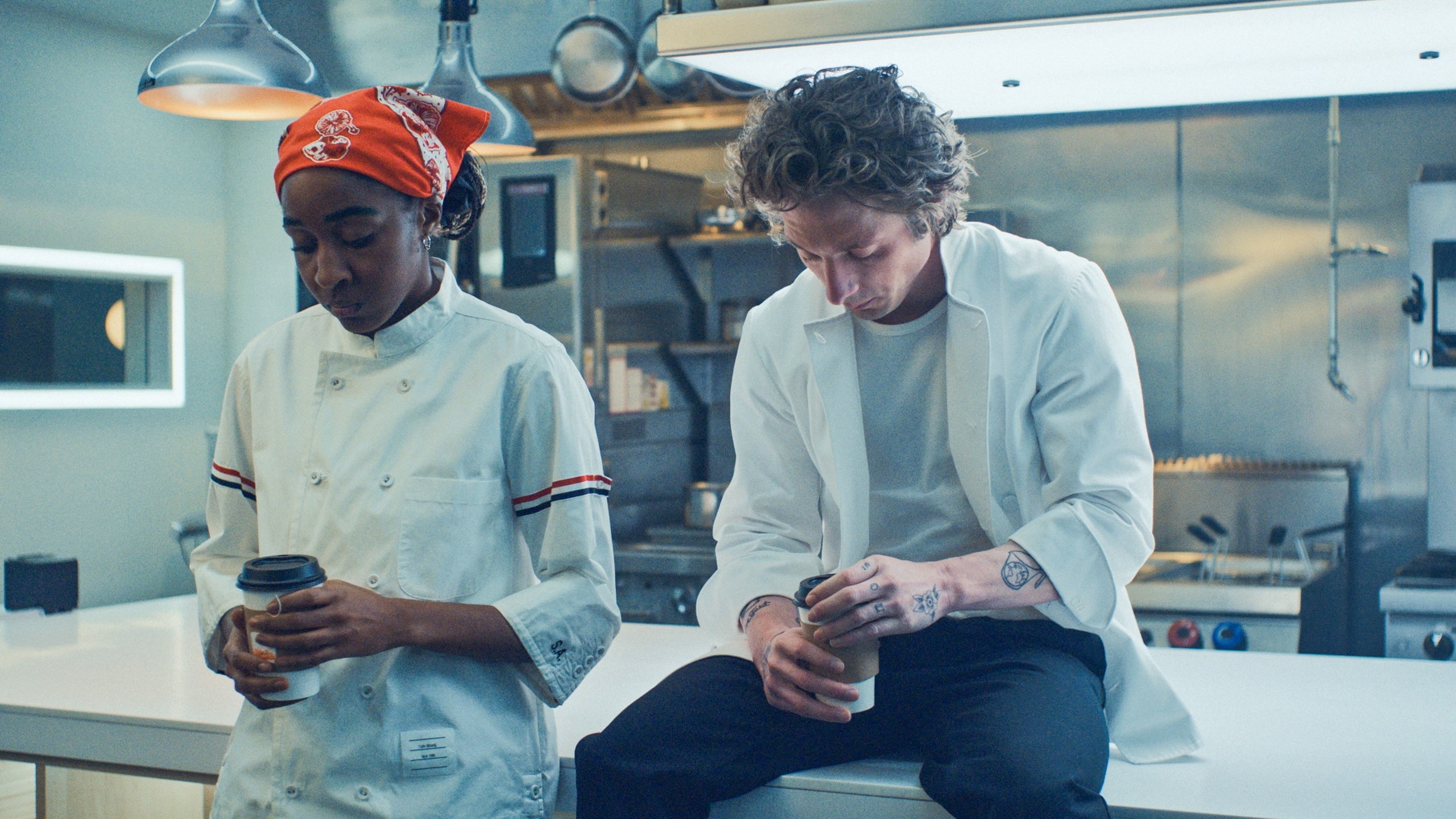While a nation has spent the past two years saying a hearty “yes, chef!” to FX’s restaurant drama The Bear—and it is indeed a drama, despite the Emmys declaring it a comedy—some of us have been unable to join the chorus. Christopher Storer’s show has its merits: artful aesthetics, committed performances, insider knowledge of a fascinating industry. But it is also a series confused (or careless) about its intentions, unwilling to commit to anything—tone, tempo, purpose—except its own idea of itself as something grand.
The Bear (whose third season premiered on Hulu on June 26) is a series whose experiments in form sometimes seem more calculating than curious. In contrast to the humble milieu the show aims to soberly depict—scrappy folks working hard to make something special—Storer increasingly stages the show as fugues of visual and aural poetry. He futzes with timeline and perspective, dares to present near entirely plotless episodes. But the central premise of the show has not been developed enough to support all this messing around. Storer seems more eager to show us what he can do on a technical level than he is in holding The Bear together as a cohesive, discrete series.
What is The Bear about? The anxieties and griefs of work and family. Ambition and the alienation it creates. Those are worthy subjects, and on occasion the show makes poignant assessment of them. But in all its shifts in style and focus, The Bear does not, after three seasons, seem to be building to much of anything. Challenging creaky notions of television structure is all well and good—in theory. Despite the now tarnished reputation of its creator, Louie memorably did just that on a different version of the same network 14 years ago, helping to kick off a trend that led us to The Bear. But that series was not really trying to tell an arced story; it was made to be episodic, non-linear. The Bear wants to have its burnt Basque cheesecake and eat it too. What results is a distracted series, one whose diversions further weaken its central plotline.
Season three (mild spoilers to follow) opens with an episode that is essentially a musical montage peppered with bits of dialogue. It churns forward and backward in time as talented and self-thwarting Chicago chef Carmy (Jeremy Allen White) contends with stresses past and present. He’s haunted by his time spent in the kitchens of other chefs—demanding but gracious Terry (Olivia Colman), a cruel if brilliant overseer played by Joel McHale—and by his recent meltdown during the opening of his own restaurant, The Bear, once a family-owned Italian beef joint. It’s lovely to look at and a bit overbearing, yet another noodling with form that forsakes narrative for mood.
The standalone experiments are the strongest parts of season three. The eighth episode, “Ice Chips,” is essentially a two-hander between side characters—Abby Elliott’s Sugar and Jamie Lee Curtis’s difficult matriarch Donna—as they navigate a major life rite in tight closeup, bickering and reconciling. The acting is big, but it works; it’s the highlight of the season. Episode six, “Napkins,” is another standout, a gentle look back at one character’s origin story (sort of) that features graceful performances (especially from the great Liza Colón-Zayas) and credibly lived-in writing. The episode was deftly directed by series co-star Ayo Edebiri.
When things return to the kitchen, though, the show strains for meaning. The case for caring about this enterprise as much as Carmy does has never been adequately made; all of his high drama about his work too often feels silly, overwrought. Cooking as a metaphor for the struggle of life is a potentially intriguing concept, but The Bear doesn’t do much to flesh out the idea—it simply asks that we accept the premise and groove on Storer’s mannered adventures in style. The Bear is loaded with generic conversations about Big Things and plaintive needle drops to the point of self-parody. Only toward the very end of a ten-episode season do we see some true processing of Carmy’s tortured professional psyche—it’s appreciated, but arrives too late.
What passes for humor on the show is essentially guys yelling “fuck you” to each other, an exhausting shtick repeated ad nauseam. These jags of banter badly pierce the bubble of the show’s supposed realism. Is this a verité look at the workings of a high-stakes kitchen, or caustic hyperbole? Again, the show wants to be both, and thus satisfies neither side.
Perhaps the most enlightening parts of season three are when we get to watch real chefs go about their craft. Thomas Keller warmly teaches Carmy to truss a game hen. Daniel Boulud glides through in lilting voice. A “funeral” dinner for a beloved restaurant’s closing sees the appearance of many more luminaries from the culinary world, who all offer bits of wisdom or funny anecdotes about what it is to do their strange job. Here is the truth and insight The Bear is always striving for; briefly, we are caught up in the show’s idea that this is all rather profound. But then in clunks Carmy, with his greasy hair and watery eyes. A wistful folk song starts playing, and it’s back to the fakey gravity of The Bear, its meat both over- and under-cooked, and seasoned almost to death.
More Great Stories From Vanity Fair
Peter Thiel, J.D. Vance, and the Dangerous Dance of the New Right
Ivanka Trump, Sensing Power, Slinks Back to the National Stage
An Epic First Look at Gladiator II
Looking for Love in the Hamptons? Buy a Ticket for the Luxury Bus.
The Dark Origins of the True-Crime Frenzy at CrimeCon
Palace Insiders on the Monarchy’s Difficult Year
The Best TV Shows of 2024, So Far
Listen Now: VF’s Still Watching Podcast Dissects House of the Dragon

